
Helga Ursula "Uschi" Glas, sometimes credited as Ursula Glas, is a German actress in film, television, and on stage, and a singer.

Heinrich Wilhelm "Heinz" Rühmann was a German film actor who appeared in over 100 films between 1926 and 1993. He is one of the most famous and popular German actors of the 20th century, and is considered a German film legend. Rühmann is best known for playing the part of a comic ordinary citizen in film comedies such as Three from the Filling Station and The Punch Bowl. During his later years, he was also a respected character actor in films such as The Captain from Köpenick and It Happened in Broad Daylight. His only English-speaking movie was the 1965 Ship of Fools.
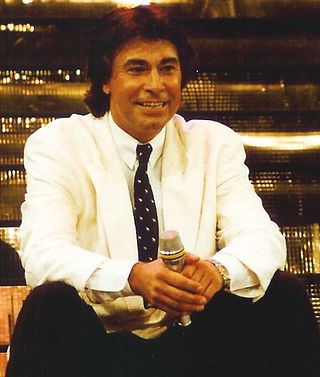
Gerhard Höllerich, known professionally as Roy Black, was a German schlager singer and actor, who appeared in several musical comedies and starred in the 1989 TV series, Ein Schloß am Wörthersee.
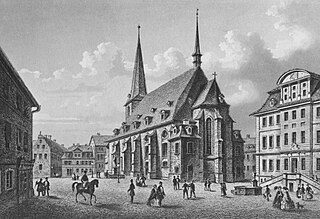
Der Himmel lacht! Die Erde jubilieret, BWV 31, is a church cantata by Johann Sebastian Bach for the first day of Easter. Bach composed the cantata in Weimar and first performed it on 21 April 1715.
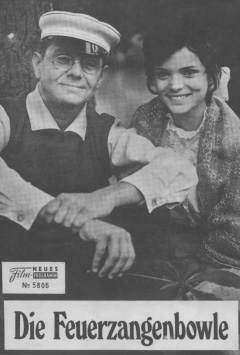
Die Feuerzangenbowle is a 1970 West German film based on the book of the same name and a remake of the 1934 and 1944 films. This version of was part of a number of 1970s films concentrating on the theme of modernizing the school system. It was much less successful than its predecessors.

Theo Lingen, born Franz Theodor Schmitz, was a German actor, film director and screenwriter. He appeared in more than 230 films between 1929 and 1978, and directed 21 films between 1936 and 1960.

The Bravo Otto is a German accolade honoring excellence of performers in film, television and music. Established in 1957, the award is presented annually, with winners selected by the readers of Bravo magazine. The award is presented in gold, silver and bronze and, since 1996, an honorary platinum statuette presented for lifetime achievement.
Jan Christoph Krause, known by his stage name Hansi Kraus or Hans Kraus, is a German actor.
Zur Hölle mit den Paukern is a 1968 West German comedy film directed by Werner Jacobs and starring Hans Kraus, Theo Lingen and Günther Schramm. It was the first entry into the seven part Die Lümmel von der ersten Bank series of comedy films.
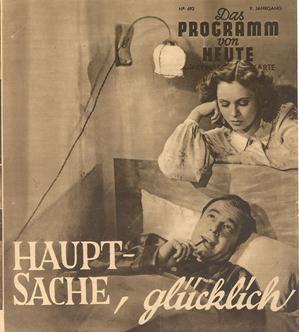
Happiness is the Main Thing is a 1941 German comedy film directed by Theo Lingen and starring Heinz Rühmann, Hertha Feiler and Ida Wüst. It was shot at the Bavaria Studios in Munich and the Hostivar Studios in Prague. The film's sets were designed by the art directors Rudolf Pfenninger and Ludwig Reiber. It premiered at the Gloria-Palast in Berlin.

The Postponed Wedding Night is a 1953 West German comedy film directed by Karl Georg Külb and starring Margot Hielscher, Theo Lingen and Viktor Staal. It was based on a play by Franz Arnold and Ernst Bach. It was shot at the Carlton Studios in Munich. The film's sets were designed by the art directors Willi Schatz and Arne Flekstad.

Secretly Still and Quiet is a 1953 West German musical comedy film directed by Hans Deppe and starring Gretl Schörg, Hans Nielsen, and Theo Lingen. It was made at the Munich Studios of Bavaria Film. The film's sets were designed by the art director Erich Kettelhut.
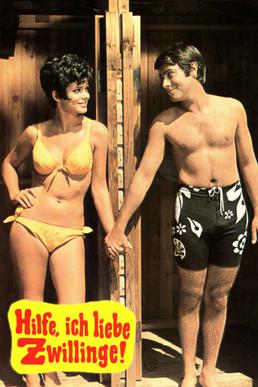
Help, I Love Twins is a 1969 West German comedy film directed by Peter Weck and starring Roy Black, Uschi Glas, and Eddi Arent.

Always Trouble with the Teachers is a 1968 West German comedy film directed by Harald Vock and starring Roy Black, Uschi Glas, and Peter Weck.

The Mad Aunts Strike Out is a 1971 West German comedy film directed by Franz Josef Gottlieb and starring Rudi Carrell, Ilja Richter, and Mascha Gonska. It is part of a series of cross-dressing comedies inspired by Charley's Aunt and Some Like It Hot.

The Reverend Turns a Blind Eye is a 1971 West German comedy film directed by Harald Vock and starring Roy Black, Uschi Glas and Georg Thomalla. It was followed by a 1972 sequel Always Trouble with the Reverend.

We'll Take Care of the Teachers is a 1970 West German comedy film directed by Harald Reinl and starring Uschi Glas, Hansi Kraus and Fritz Wepper. It was the fifth in a series of school-set films.

The Body in the Thames is a 1971 West German thriller film directed by Harald Philipp and starring Uschi Glas, Hansjörg Felmy and Werner Peters. It is part of the series of Edgar Wallace adaptations made by Rialto Film. It was the last shot in Germany, with two Italian films following before the end of the series.

The Monk with the Whip is a 1967 West German mystery thriller film directed by Alfred Vohrer and starring Joachim Fuchsberger, Uschi Glas and Grit Boettcher. It is inspired by the 1926 novel The Black Abbot and subsequent 1927 play The Terror by Edgar Wallace which also served as the basis for the 1965 film The Sinister Monk. It was made as part of Rialto Film's long-running series of film adaptations of Wallace's works.

Don't Get Angry is a 1972 West German comedy film directed by Peter Weck and starring Uschi Glas, Beppo Brem and Georg Thomalla. It takes its name from a popular German board game.


















